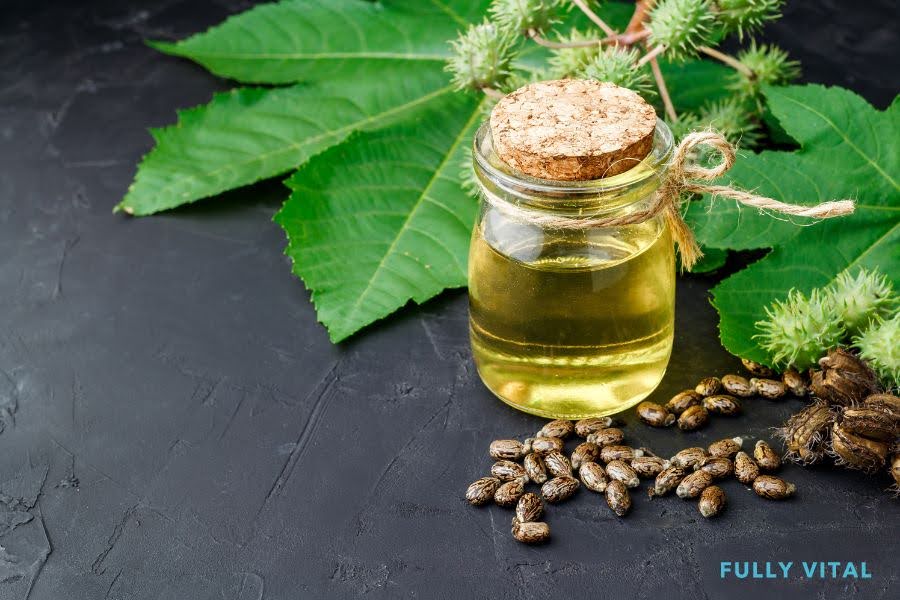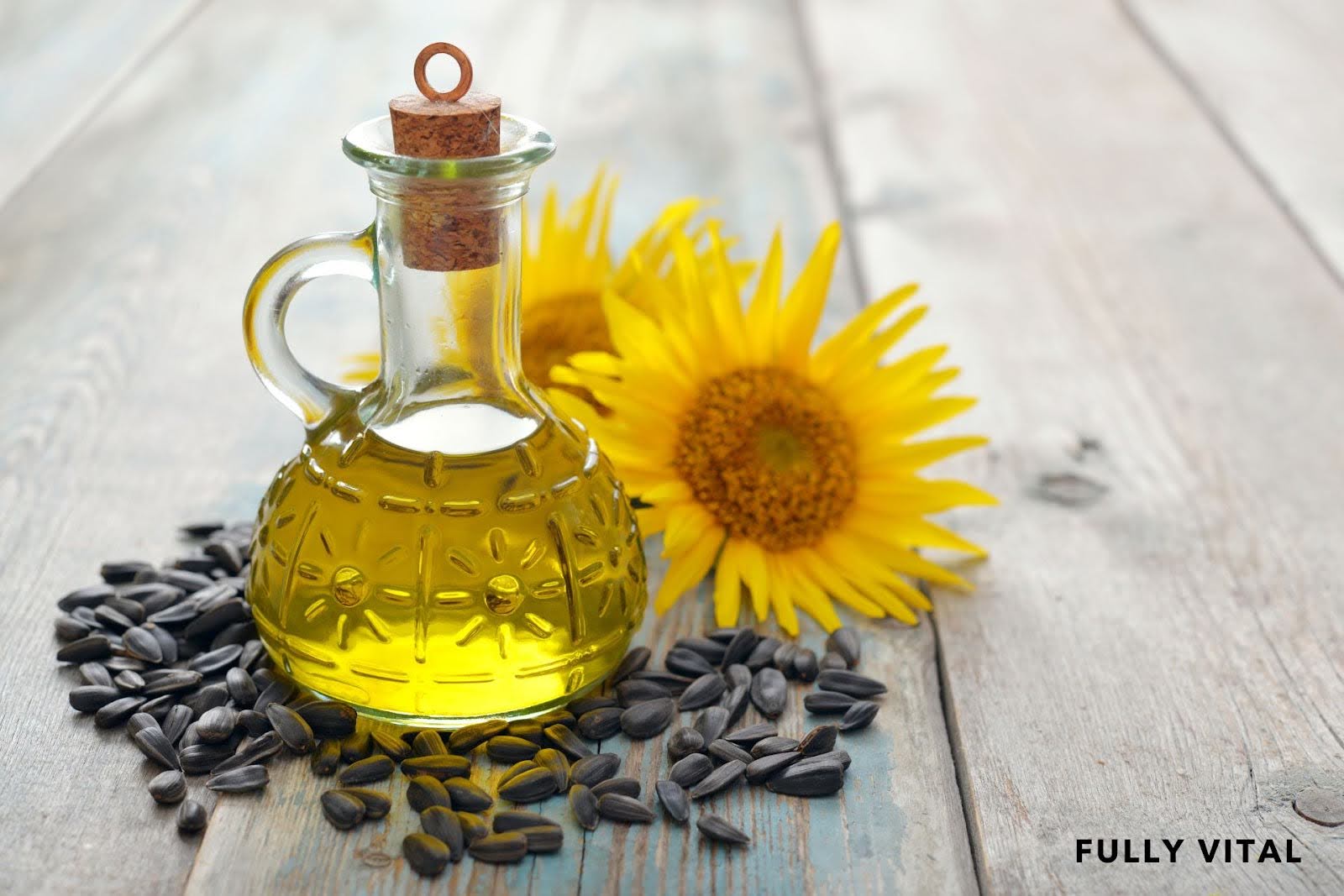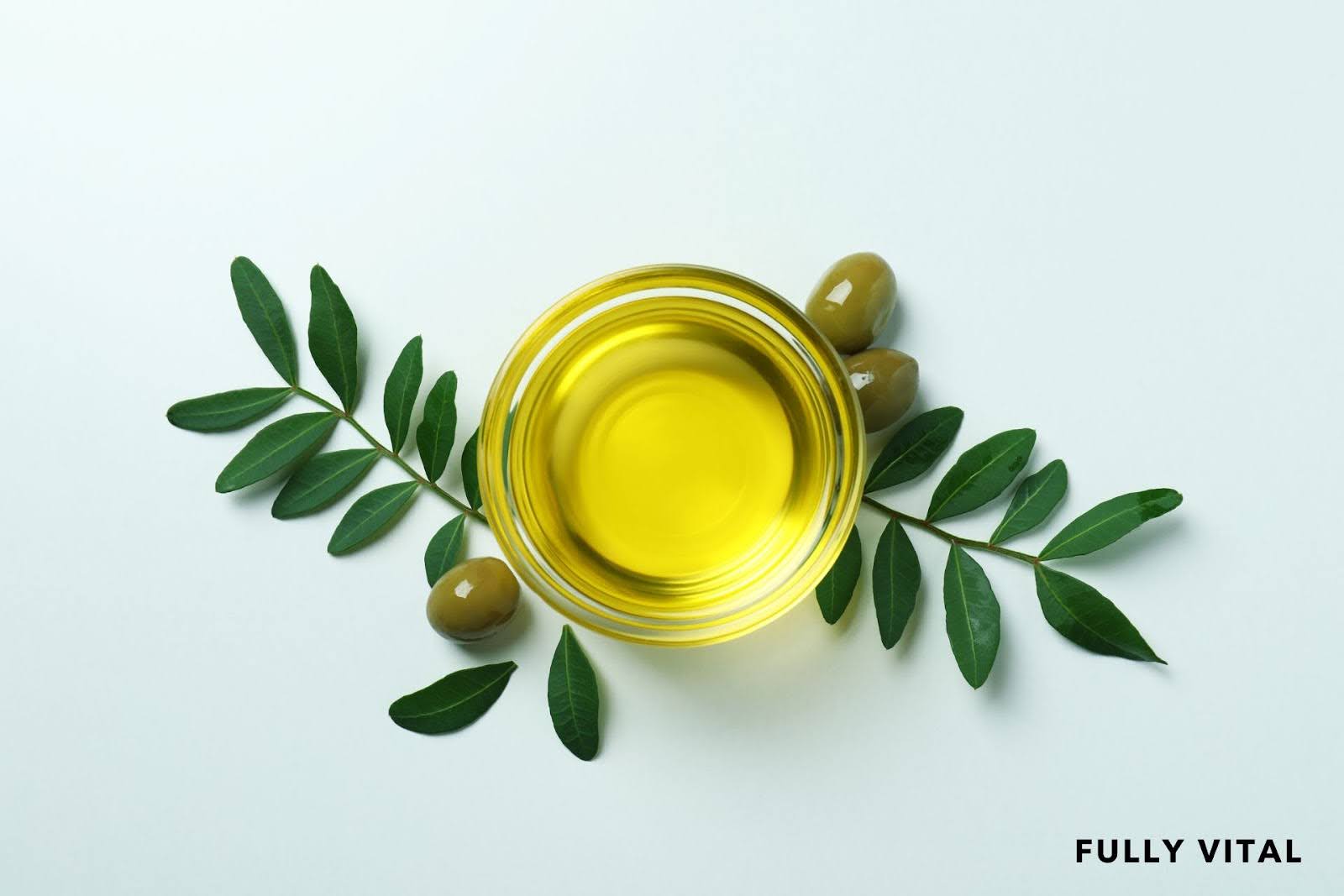
Castor Oil: The Growth Elixir for Hair
When it comes to natural remedies for hair care, castor oil has been a long-standing favorite.
Its popularity isn't just a trend; it's rooted in its unique composition and the benefits it offers for hair health and growth.
In this article, we will explore the myriad ways castor oil can be a game-changer in your hair care routine.
From its historical use to the scientific rationale behind its effectiveness, we aim to provide a comprehensive understanding of why castor oil is often referred to as a 'growth elixir' for hair.
Additionally, for those seeking a more advanced solution, Fully Vital's Enhance Hair Density Serum combines the benefits of natural ingredients with scientific innovation to further support hair health and growth.
Whether you're dealing with hair thinning, looking for natural ways to enhance hair growth, or simply want to maintain healthy hair, this guide, along with Fully Vital's serum, will offer valuable insights into the world of castor oil.

I LOVE MY HAIR NOW
FullyVital hair serum and hair vitamins made tremendous improvements in my hair. I truly love my hair now.
Shop Hair ProductsWhat Exactly Is Castor Oil?
Castor oil is a natural substance extracted from the seeds of the Ricinus communis plant.
This oil is unique due to its high concentration of ricinoleic acid, a monounsaturated fatty acid known for its moisturizing and anti-inflammatory properties.
Unlike other oils, castor oil has a thicker consistency and a distinctive, slightly nutty aroma.
It is rich in vitamins, minerals, and other fatty acids, making it a nourishing concoction for various health and beauty applications, especially in hair care.
Castor oil's versatility and effectiveness have made it a staple in many traditional and modern beauty treatments.
How Has Castor Oil Been Used Historically In Hair Care?
Traditional Practices And Beliefs
Castor oil's use in hair care dates back centuries, with its roots in various traditional practices around the world.
In ancient Egypt, it was used as a hair treatment to protect and nourish hair in the harsh desert climate.
Similarly, in India, castor oil has been a key component of Ayurvedic medicine, used to promote hair growth and scalp health.
This historical usage is not just anecdotal; it reflects a deep understanding of the oil's properties and its effects on hair and scalp.
These traditional beliefs have been passed down generations and continue to influence modern hair care practices.
What Are The Benefits Of Castor Oil For Hair?
Nourishing The Scalp
Castor oil's rich nutrient profile makes it an excellent scalp nourisher.
The high content of ricinoleic acid helps balance scalp pH, combatting dandruff and dry scalp issues.
Its anti-inflammatory properties soothe irritated skin, promoting a healthier environment for hair growth.
Regular application can rejuvenate the scalp, ensuring hair follicles receive the necessary nutrients to thrive.
Promoting Hair Growth
One of the most celebrated benefits of castor oil is its potential to boost hair growth.
The ricinoleic acid in the oil aids in increasing blood circulation to the scalp, which in turn stimulates hair follicles.
This enhanced nourishment can lead to stronger, thicker hair strands over time.
Additionally, castor oil's ability to moisturize the hair shaft can prevent breakage, further contributing to hair length retention.
Enhancing Hair Texture
Castor oil is renowned for its ability to enhance the texture and appearance of hair.
Its deep moisturizing capabilities can transform dry, brittle hair into softer, more manageable locks.
The oil's fatty acids coat the hair shaft, adding shine and reducing frizz.
Regular use can result in smoother, healthier-looking hair that is easier to style.

How Should Castor Oil Be Applied For Maximum Benefits?
Preparing The Scalp For Application
Before applying castor oil, it's essential to prepare the scalp.
Start with a clean, slightly damp scalp to ensure better absorption of the oil.
Gently brushing your hair can also help in removing any tangles and stimulates blood circulation in the scalp, making it more receptive to the treatment.
This preparatory step is crucial for maximizing the benefits of castor oil application.
The Right Application Technique
For effective application, warm the castor oil to a comfortable temperature to enhance its penetrative abilities.
Using your fingertips, apply the oil directly onto the scalp in sections, ensuring even coverage.
Gently massage the oil into the scalp with circular motions for several minutes.
This massage not only helps in evenly distributing the oil but also boosts blood circulation, further aiding in nutrient absorption and hair growth stimulation.
Combining With Other Ingredients For Enhanced Effects
Castor oil's benefits can be amplified by combining it with other hair-friendly ingredients.
Mixing castor oil with lighter oils like coconut or jojoba oil can make it easier to spread and add additional nutrients.
Essential oils like rosemary or peppermint can also be added for their hair growth-promoting properties.
Such combinations not only enhance the nourishing effects but also make the application process more pleasant and effective.

Are There Any Side Effects Or Precautions When Using Castor Oil?
Potential Allergic Reactions
While castor oil is generally safe for most people, it's important to be aware of potential allergic reactions.
Before using it extensively, a patch test should be conducted by applying a small amount of oil to the skin and waiting for 24 hours to observe any adverse reactions.
Signs of an allergic reaction may include redness, itching, or swelling.
It's particularly crucial for individuals with sensitive skin or known allergies to be cautious.
In case of an allergic reaction, discontinue use immediately and consult a healthcare provider.
Overuse And Scalp Build-Up
Overuse of castor oil can lead to issues such as scalp build-up or clogged hair follicles, especially due to its thick consistency.
It's advisable to use the oil in moderation and ensure thorough cleansing of the scalp after use.
Excessive application can also make hair excessively greasy and heavy, potentially attracting dirt and dust.
A balanced application, ideally not more than once or twice a week, is sufficient to reap its benefits without negative effects.
Regular and proper scalp cleansing is essential to prevent any build-up from prolonged castor oil use.
Interactions With Other Hair Treatments
Castor oil might interact with certain hair treatments or chemical processes.
Individuals who regularly color, perm, or use other chemical treatments on their hair should be cautious when incorporating castor oil into their routine.
It's wise to consult a hair care professional before combining these treatments, as the oil can potentially affect how hair reacts to chemicals.
Furthermore, castor oil should be used judiciously in combination with other heavy oils to avoid overburdening the hair.
Being mindful of these interactions ensures safe and effective use of castor oil in conjunction with various hair treatments.
How Does Castor Oil Compare To Other Hair Care Oils?
Castor Oil Vs. Coconut Oil
Castor oil and coconut oil are both popular in hair care, but they serve different purposes.
Castor oil, with its high ricinoleic acid content, is primarily known for promoting scalp health and hair growth.
In contrast, coconut oil is rich in lauric acid, making it excellent for hair conditioning and protein retention.
While castor oil excels in strengthening the hair roots and fostering growth, coconut oil is better for overall hair shaft nourishment and preventing protein loss.
Users may choose one over the other depending on their specific hair needs or even combine them for a comprehensive hair care routine.
Castor Oil Vs. Argan Oil
Argan oil, often called 'liquid gold', is renowned for its moisturizing properties and high vitamin E content.
Compared to castor oil, argan oil is lighter and more easily absorbed by hair, making it ideal for adding shine and reducing frizz.
While argan oil is excellent for hair manageability and softness, castor oil stands out for its ability to stimulate hair growth and improve scalp health.
Argan oil is a great choice for daily styling and smoothing, whereas castor oil is more suitable for targeted scalp treatments and hair growth strategies.
Castor Oil Vs. Olive Oil
Olive oil is another common household oil used in hair care, known for its hydrating and protective qualities.
Unlike castor oil, which is dense and potent, olive oil has a lighter consistency and is rich in oleic acid, making it great for deep conditioning and protecting hair from damage.
Castor oil, with its thicker texture, is better suited for scalp treatments and improving hair strength from the roots.
While olive oil can be used more frequently as a conditioner or for hot oil treatments, castor oil is typically used less frequently but with a focus on long-term hair growth and health improvement.
Discover the Power of Fully Vital Hair Growth ProductsAt Fully Vital, we understand the frustration and concern that comes with the aging of your hair. That's why we have developed a range of hair growth products that are designed to stop and reverse the aging process, giving you healthier, more resilient locks. Here are some key features and benefits of our products:
With Fully Vital, you can take control of your aging hair and achieve the beautiful, vibrant locks you deserve. Experience the power of our hair growth products and unlock your hair's true potential. |
Final Thoughts On Castor Oil
Castor oil is a multifaceted natural remedy with a rich history and scientifically backed benefits for hair care.
Whether seeking to nourish the scalp, promote hair growth, or enhance hair texture, castor oil offers a natural, effective solution.
For those looking to incorporate this wonder oil into their hair care regimen, consider the Enhance Hair Serum (3-Pack) from FullyVital, which harnesses the benefits of castor oil along with other hair-friendly ingredients.
Remember to use it wisely, considering any personal allergies or skin sensitivities, and enjoy the journey to healthier, more vibrant hair.
Frequently Asked Questions About Castor Oil
How is castor oil extracted and what makes it unique?
Castor oil is extracted from the seeds of the Ricinus communis plant through cold pressing, retaining most of its natural nutrients and bioactive compounds.
Its high content of ricinoleic acid is key to its therapeutic properties.
Can castor oil be used for all hair types?
Yes, castor oil can be beneficial for all hair types.
However, the amount and frequency of application might vary depending on hair texture and individual needs.
How often should castor oil be applied for hair growth?
For hair growth, using castor oil once or twice a week is generally recommended.
Overuse can lead to scalp build-up, so moderation is key.
Can castor oil help with scalp conditions like dandruff?
Yes, the anti-inflammatory and antimicrobial properties of castor oil can help in treating scalp conditions like dandruff and dry scalp.
What is the best way to apply castor oil to hair?
The best way is to warm the oil slightly, apply it to the scalp with gentle massages, and extend it along the hair strands.
Leaving it on for at least an hour or overnight before washing can be effective.
Can castor oil be mixed with other ingredients for enhanced benefits?
Yes, mixing castor oil with lighter oils like coconut or jojoba oil, or essential oils like rosemary, can enhance its benefits and ease of application.
Should people with chemically treated hair use castor oil?
While generally safe, those with chemically treated hair should be cautious and may consult a hair care professional before using castor oil, as it can interact with certain treatments.
Can castor oil prevent hair loss?
Castor oil can help in reducing hair loss by strengthening the roots and nourishing the scalp, but it's not a guaranteed cure for all types of hair loss.
Is castor oil effective in treating split ends?
While it can't repair split ends (as trimming is the only true remedy), castor oil can help prevent them by moisturizing and strengthening hair strands.
Can castor oil change hair texture?
Castor oil doesn't change the natural texture of hair, but it can make hair smoother and more manageable by providing deep moisturization.
Sources:
- Patel, V. R., Dumancas, G. G., Viswanath, L. C., Maples, R., & Subong, B. J. (2015). Castor Oil: Properties, Uses, and Optimization of Processing Parameters in Commercial Production. Lipid Insights, 8, 1-12. https://doi.org/10.4137/LPI.S40233
- Marwah, M., Perrett, D., & Iorizzo, M. (2020). The Role of Nutraceuticals in Hair Loss. Clinics in Dermatology, 38(3), 319-325. https://doi.org/10.1016/j.clindermatol.2020.03.012
- Achten, G., & Wanet-Rouard, J. (1963). Studies on the Chemistry and Application of Castor Oil. Journal of the American Oil Chemists' Society, 40(6), 319-326. https://doi.org/10.1007/BF02632409
- Mcmullen, R., & Jachowicz, J. (1998). Optical Properties of Hair: Effect of Treatments on Luster as Quantified by Image Analysis. Journal of Cosmetic Science, 49(4), 249-259. http://journal.scconline.org/pdf/cc1998/cc049n04/p00249-p00259.pdf
- Keis, K., Persaud, D., Kamath, Y. K., & Rele, A. S. (2005). Investigation of Penetration Abilities of Various Oils into Human Hair Fibers. Journal of Cosmetic Science, 56(5), 283-295. http://journal.scconline.org/pdf/cc2005/cc056n05/p00283-p00295.pdf
- Lawless, J., & Allan, J. (1992). Encyclopedia of Essential Oils: The Complete Guide to the Use of Aromatic Oils in Aromatherapy, Herbalism, Health, and Well Being. Harper Collins.
- Gavazzoni Dias, M. F. R. (2015). Hair Cosmetics: An Overview. International Journal of Trichology, 7(1), 2-15. https://doi.org/10.4103/0974-7753.153450
- Rele, A. S., & Mohile, R. B. (2003). Effect of Mineral Oil, Sunflower Oil, and Coconut Oil on Prevention of Hair Damage. Journal of Cosmetic Science, 54(2), 175-192. http://journal.scconline.org/pdf/cc2003/cc054n02/p00175-p00192.pdf
- Umar, M., Sastry, K. S., Al Ali, F., Al-Khulaifi, M., Wang, E., & Chouchane, A. I. (2018). Role of Essential Oils in the Management of Alopecia. Evidence-Based Complementary and Alternative Medicine, 2018, 1-10. https://doi.org/10.1155/2018/9548304
- Davis, M. G., Thomas, J. H., van de Velde, S., Boissy, Y., Dawson, T. L., Iveson, R., & Sutton, K. (2011). A Novel Cosmetic Approach to Treat Thinning Hair. British Journal of Dermatology, 165, 24-30. https://doi.org/10.1111/j.1365-2133.2011.10633.x








